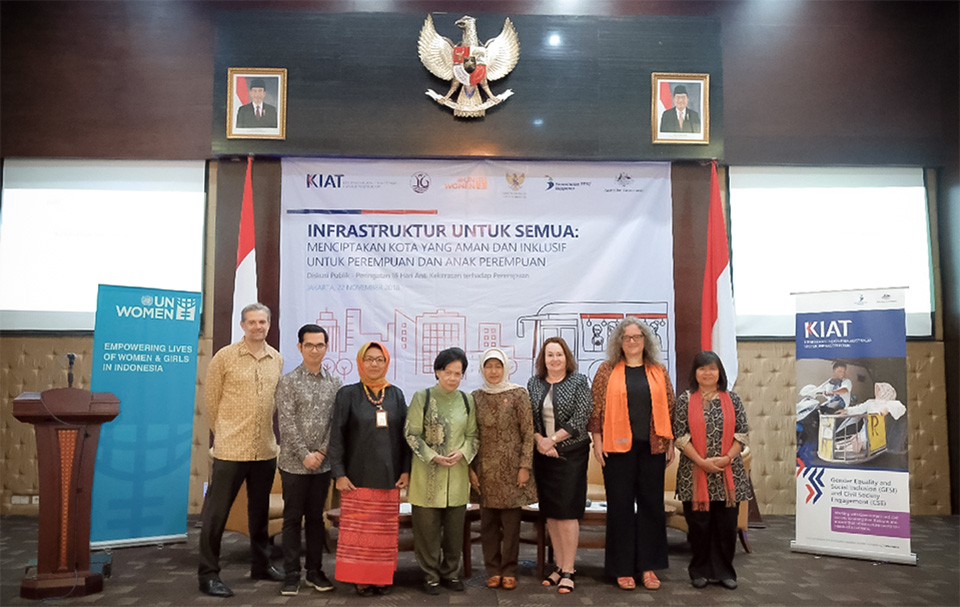Indonesia discusses infrastructure improvements to make its cities safer for women and girls
Date:
Author: Radhiska Anggiana
Jakarta, Indonesia — To shine a spotlight on factors that help create safe public spaces for women and girls in Indonesia, a talk show was held in late November 2018, to mark the 16 Days of Activism against Gender-Based Violence. Dubbed “Infrastructure for All: Creating Safe and Inclusive Cities for Women and Girls”, the discussion was organized by the Presidential Special Staff Office, the Indonesia Australia Infrastructure Partnership (KIAT), and UN Women.
The discussion highlighted findings from UN Women’s scoping study “Safety Audit in Three Areas of Jakarta” and its joint study with Pulse Lab Jakarta “After Dark: Safe Women Transit at Night”, both recently released as part of UN Women’s programme on Safe Cities and Safe Public Spaces.
“Most of our respondents have experienced and/or witnessed verbal violence in public spaces, such as harassment, cat calling, and sexual violence,” explained Iriantoni Almuna, Programme Officer for UN Women Indonesia. “Because this happens very often, [there is a] lack of response from bystanders, and there are tendencies to blame the victim, they see this as something normal. They also see harassment and violence against women as an inevitable part of living in the city.”

During the public discussion, participants had the opportunity to exchange ways that everyone can contribute to making their city safer and more inclusive.
“Very often women and girls living outside of urban centres are at a greater risk through the intersection of poverty, isolation, low education levels and inadequate basic services,” said Jan Edwards, Deputy Director for Gender Equality, Social Inclusion and Civil Society Engagement at KIAT. “The night-time trip to the toilet for some women and girls is fraught with danger, as is the trip to the market, school, university or place of employment—the risks of sexual harassment and violence are ever-present for women just going about their daily business in cities and in rural areas,” adding that KIAT supports creating safe spaces and the potential for women to advance economically through infrastructure development.
Baby Setiawati Dipokusumo, of the Ministry of Public Works and People’s Housing (PUPR), said special attention was paid to gender mainstreaming in the Ministry and it has been included in the PUPR’s strategic planning for 2015-2019. “The Ministry is obliged to build infrastructure that is integrated, effective and efficient… We admit that in the implementation of gender mainstreaming, we still found challenges. However, we tried to continuously incorporate the needs of both genders in infrastructure planning,” she said.
Yuniyanti Chuzaifah, Vice-Chair of the National Commission on Violence against Women, highlighted that infrastructure development should not be male-dominated. She said women should be represented in planning and in all stages of building safe cities and safe public spaces.
The public discussion was part of a series of activities held to commemorate the 16 Days of Activism against Gender-Based Violence, in partnership with the Presidential Special Staff Office.
“Let’s discuss how infrastructure is vital to ensure the safety of women and girls,” said Siti Ruhaini Dzuhayatin, Special Staff to the President of the International Religious Affairs, as she opened the event and hailed joint efforts with partners to “make the following 16 days a momentum for us all to end violence against women everywhere.”